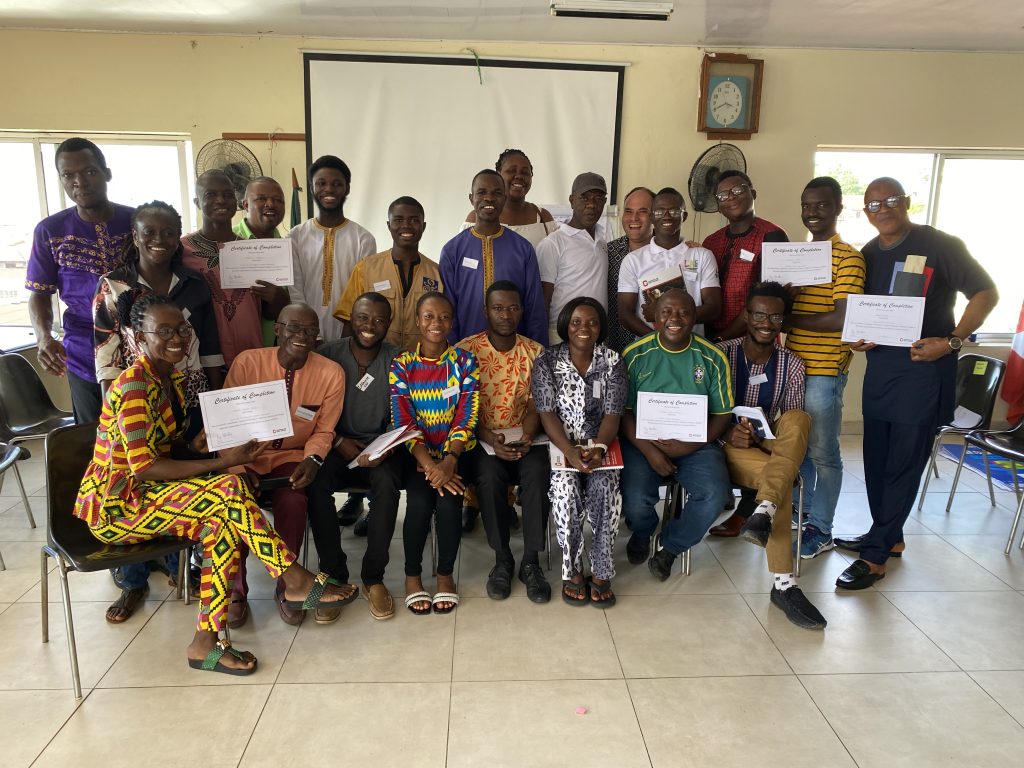Santigie Bayo Dumbuya, Alfred Kargbo and Lauren Kinnaird
In this article, the authors reflect on the importance of ensuring that local perspectives and practitioner knowledge are prioritised by the Consortium for Street Children (CSC) when developing training resources for their 200 network member organisations working with street-connected children.
CSC is a global network and children’s rights organisation. It links organisations, practitioners, researchers, and policymakers globally who are addressing the needs and rights of street-connected children. CSC works with and through its network to deliver advocacy, research, and learning initiatives. We Yone Child Foundation (WYCF) is a non-governmental organisation (NGO) based in Freetown, Sierra Leone. WYCF improves the lives of vulnerable children and their families through access to quality education and self-empowerment opportunities. Concern for the Deprived Welfare Association (CoDWelA) is an NGO based in Waterloo, Sierra Leone. It facilitates children’s access to emergency assistance, psychosocial support, family reintegration, education, advocacy, and legal aid support.
Project rationale
The Grafton community near Freetown, Sierra Leone, has been hugely affected by devastating civil war, Ebola, COVID-19 and natural disasters. These have impacted children through direct and intergenerational trauma. In August 2022, street workers1 in Grafton conducted street mapping. They identified over 300 street-connected children who had dropped out of school and were frustrated about not accessing education. Even when in school, poverty, stigma, lack of livelihoods, sexual exploitation, and teenage motherhood, often hindered them from learning.
More than 80% of the street-connected children had experienced trauma, highlighting to WYCF the dire need to address this trauma. Many young people expressed a desire for trauma healing and support to learn skills for future self-reliance. In response, CoDWelA and WYCF engaged vocational teachers, stakeholders, youth leaders and young people in group discussions to decide what is needed within trauma-informed training.
Two assumptions became clear in conceptualising the training: the importance of the training having local relevance, and the need for transferability to other contexts. Therefore, while partners in Sierra Leone initially shaped the approaches, CSC coordinated processes so the wider CSC network could input into the training development. In 2022, CSC set up a global Education Working Group. Members come from organisations with a wealth of expertise in education programming focused on street-connected children. These organisations formed an advisory board to review the training. In addition, Yvonne Gache, an expert Critical Psychologist based in Kenya, supported the training development.
Developing the training
An online focus group with teachers and social workers from WYCF and CoDWelA, captured the team’s understanding of trauma, how to build resilience, and where they needed further training. During the focus group, participants described experiences of working with trauma-affected children. They shared observations of how children display trauma, how they currently seek to support them, and what they would like to know more about.
For example, the need for basic trauma first-aid skills was raised, to help participants deliver support on the street or in schools in the absence of trauma specialists and psychologists. The session helped identify knowledge gaps which were incorporated into the training content list alongside participant suggestions. The focus group discussion developed a deeper understanding of practitioners’ experiences of children’s trauma and how it affects learning outcomes.
The learning was shared with CSC’s Education Working Group, who gave positive feedback. They wanted to receive the training and were particularly interested in how to:
- understand children’s challenging behaviours and immediate responses;
- build trust with children who have experienced trauma;
- define resilience;
- identify different types of trauma;
- develop strength-based approaches to trauma.
Members of the working group from Cities for Children and Glad’s House Kenya shared their expertise around resilience, which they felt was crucial to the training content. In their experience, children who say that they are ‘fine’ or not affected by their trauma, are not necessarily showing resilience, but their responses could be mistaken for this.
When researching topics to inform training content development, we prioritised sources written in or referencing the global South. This was difficult for some themes, but it was essential to avoid basing the training solely on US and UK practice. We developed a training manual and accompanying handbook, containing further detailed reading for trainees. Cities for Children further reviewed the resilience activities and provided a case study to include in the training.
Reviewing and piloting the resource
The first draft was shared with the Education Working Group who reviewed it before giving feedback at an online workshop. This session helped to identify topics the group were most interested in and areas that needed to be further developed. The group also identified where the language was too technical to ensure nothing was lost in translation. The working group members shared their experiences and highlighted the similarities between different contexts.
As a result of the process, street workers and teachers at all levels of the development process felt that their experiences, views, and contributions were valued, especially as they were used to develop the training content. This gave them ownership and enabled the inclusion of content from their own local contexts and points of view.
The training was trialled in October 2023 in Freetown, Sierra Leone. Participants from eight organisations provided feedback that informed the final training manual and handbook. The training is being shared with members of CSC’s wider network to guide street workers and teachers in their engagement with and support of trauma-affected, street-connected young people. Street workers are using the training to engage youth leaders, community stakeholders, and ‘street champion’ peer leaders, to support young people in their local areas to overcome daily trauma, advocate for a reduction in stigma and discrimination, and promote more inclusion in societal activities.

[1] Street workers are education and social work practitioners who directly support children through street-based outreach work.
Santigie is the Director at WeYone Child Foundation. Alfred is the Director at Concern for the Deprived Welfare Association. Lauren is the Senior Programme Officer at Consortium for Street Children. They can be contacted via: projects@streetchildren.org.
